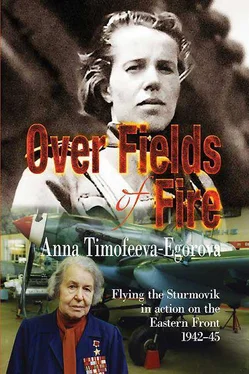One more pass, then another… Suddenly my plane was thrown up as if someone had kicked it from underneath. Then another blow, a third one… It became hard to control the plane. It didn’t obey me, it was climbing up. I was now flying without taking any evasive action: all my efforts, all my attention were concentrated on trying to put the Sturmovik into the dive again and to open fire. I managed to do that, and I led the group again for another pass directed at the tanks. But my wingmen could see better the condition my plane was in. Someone yelled to me over the radio: “Get back to our lines!”
“Apparently the plane is shot up”, I thought, and suddenly everything fell silent. Communications with Nazarkina vanished too. “Has she been killed?..” flashed through my mind. But the plane shuddered as in a fever: the Sturmovik wasn’t obeying the controls. I wanted to open the cockpit but I couldn’t. I was choking from smoke. My spiralling plane was on fire… I was on fire along with it…
33. “She died a hero’s death”
The pilots who had returned from the sortie reported that Egorova’s crew had been killed in the target area. As was done in such cases, they sent a death notice to my mum, Stepanida Vasilievna Egorova in the village of Volodovo in the Kalinin Region. However, this time death had missed me again: miraculously, I’d been thrown out of the burning Sturmovik . When I opened my eyes I saw that I was falling with no parachute canopy over my head. Just above the ground (I don’t remember how it happened myself), I jerked the ring, and the smouldering parachute opened up, although not completely…
I regained consciousness with terrible pain engulfing my whole body — it was so strong that I couldn’t move. My head burned like fire, my spine hurt unbearably, as did my arms and legs, scorched nearly to the bone. When I half-opened my eyes with difficulty I saw a soldier in a grey-green uniform over me. A terrible realisation shot through me stronger than any pain: “A Fascist! I’m in the Fascist’s hands!” This was the one thing I’d feared most of all in the war. The moral pain was a hundred times more dreadful than fire, bullets, physical pain. Only one thought pulsated feverishly inside my head: “I’ve been captured!” Helpless, incapable of resistance! I couldn’t even stretch my arm towards my pistol! And the German set his foot against my chest and pulled my broken arm for some reason. Oblivion…
The next time I came to my senses was from hitting the ground: the Hitlerites had tried to seat me in a vehicle but I couldn’t stay upright. I was falling as soon as they let go. Then they brought a stretcher and put me on that. As if in a dream I heard Polish. “Maybe the partisans have snatched me away?” the hope flashed through my mind. No, I saw the Hitlerites again and heard them conversing. “Schnell, schnell!” they were rushing two Polish medics, urging them to treat my wounds faster: a raid by Soviet aviation was on. Again a tiny ray of hope glimmered in me — our planes were around! I’d be happy if they hit this place where I was lying…
The Poles gave me no medication, they simply bandaged me, deftly hiding all my decorations and Party membership card under the bandages. I had to gather all my strength so as not to let out a moan in front of the enemy…
The Polish medics were conversing in whispers and I caught something about the Radom concentration camp. Then among the gaps in my memory there was an endlessly long shed, and when I came to my senses I found myself on the floor…
“What have they done to you, the freaks? It’d be good to put some ointment on now…” I heard a young female voice.
“Where would I get it from, this ointment? The Germans haven’t stocked medicines for us”, a male voice replied and asked straightaway: “And you, girl, who are you anyway, how did you end up here?”
“I’m a medical orderly, Yulya Krashchenko. I ended up here from the Magnuszew bridgehead beyond the Vistula, just like you. A tank ironed out the trench I was bandaging wounded men in, and then the Hitlerite submachine-gunners took us prisoners…”
“You know what, sister, I do know you. You’re from the 2nd Guards Battalion. Your commander, Captain Tskayev, is from my neighbourhood. Move over here closer to us, Orderly Krashchenko, let’s talk. We’ve examined a female pilot here, and found decorations under the bandages… We’d better take them off and hide them so as not to let the Fritzes have them. You do it, sister, it’s easier for you — the Fascists could accuse us of God knows what.”
“I understand. But where can I hide them?”
“Let’s put them into her burned flying boots — the Fascists won’t want them — they prefer new stuff”, someone else suggested.
When I heard my native speech, a spasm squeezed my throat and the first word burst out of me with my first groan: “Wa-a-ater!”
From that moment Yulia was with me all the time. The Hitelerites couldn’t drive her away from me with curses, nor with blows… I remember lying on a trestle-bed in some room of the shed, and a tearful Yulia sat next to me. Three men in rubber aprons, and with gauze bands on their faces, tore from my scorched arms and legs the bandages the Poles had put on me, tipped some powder over them and went away. As Yulia told me later, I began writhing in pain, dashing my head against the bed, yelling, losing consciousness… The Poles held in the Radom camp for participation in the Warsaw Uprising stood up for me. They began smashing windows and breaking everything indiscriminately, demanding a halt to the torture of the Russian pilot. Then these three ‘physicians’ appeared again and washed my burns of all they’d tipped on them before.
On the second day they loaded us into a freight car and rode us somewhere. Apparently the frontline was getting closer — after all it was September 1944. “Us” meant me, Yulia, a barely alive soldier from a penal company and a battalion zampolit — a completely fit Captain. He dreamed of escaping, but there had been no suitable chance, and the Captain was taking fatherly care of the dying soldier. We, the POWs, occupied one half of the car: all laying on the floor. Huge bunks were built in the second half where lay, slept, ate, played cards, sang and told jokes two German soldiers and three Ukrainian Polizei 164 164 Auxiliary policemen.
. The Germans behaved reservedly, but the Polizei lacked any mercy at all towards us, their compatriots.
Fortunately, Yulia the medical orderly was nearby. I tossed in delirium: it seemed to me all the time that I was falling to earth in a burning plane, that flames were licking my head as if they encircled it, that I should do something to break out of their strong grip… But when I regained consciousness I saw Yulia sitting next to me. “Be patient a bit longer, sweetie, one day they’ll get us somewhere. We’ll find medicine, we will for sure”, she wept and wailed.
For five days the SS guards rode us through Germany. At stops the freight car door would open with a rumble. “Look!” an SS guard would yell and many eyes, spiteful or sympathetic or indifferent, would look where on the floor lay the dying POW soldier and I.
I was very thirsty. But how could I quench my thirst when instead of my face there was a dreadful mask with its lips stuck together? It was hot. Festering appeared on my burns, I was suffocating. I wanted this agony to end fast… Five days of hell…
At last the train arrived at its destination. A column of POWs, surrounded by numerous escorts, passed through the gate of the Hitlerite ‘SZ’ camp. Fellow-sufferers carried me on a stretcher as they carry the dead to the cemetery. The gate closed behind us, they put the stretcher on the ground — and at that moment many Germans rushed up to have a look at the dying female Russian POW. I lay helpless, burned, with broken bones. I was dying…
Читать дальше












